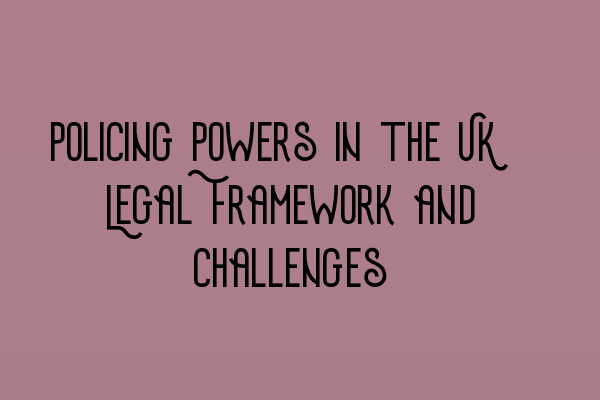Policing Powers in the UK: Legal Framework and Challenges
Welcome to the SQE Criminal Law & Practice Law UK blog! In this article, we will explore the legal framework and challenges surrounding policing powers in the United Kingdom. Policing powers play a crucial role in maintaining law and order, ensuring public safety, and upholding the justice system. It is essential for aspiring solicitors to have a solid understanding of these powers to effectively represent their clients and navigate the criminal justice system.
Legal Framework
The legal framework governing policing powers in the UK is primarily established through legislation such as the Police and Criminal Evidence Act 1984 (PACE) and the Terrorism Act 2000. These laws outline the powers and limitations of law enforcement agencies in carrying out their duties. By understanding the legal framework, solicitors can advise their clients on their rights and ensure that any evidence obtained by the police is admissible in court.
Under PACE, police officers have several powers, including the power of arrest, stop and search, and entry and search of premises. These powers are granted to the police for specific purposes, such as preventing and detecting crime, maintaining public order, and protecting the rights of individuals.
However, it is important to note that these powers must be exercised lawfully and proportionately. The Human Rights Act 1998 also plays a crucial role in ensuring that policing powers do not infringe upon an individual’s fundamental rights and freedoms. Solicitors must be aware of these legal safeguards and be prepared to challenge any unlawful or excessive exercise of policing powers.
Challenges
While policing powers are essential for maintaining the rule of law, they can also present challenges and controversies. One of the main challenges is striking a balance between public safety and individual rights. This delicate balance requires a careful consideration of the circumstances and the necessity and proportionality of the exercise of policing powers.
In recent years, there have been concerns about the use of stop and search powers, particularly regarding racial profiling and the disproportionate targeting of certain communities. Solicitors can play a crucial role in challenging the misuse of these powers and advocating for fair and equal treatment.
The advent of digital technology has also posed new challenges in relation to policing powers. Issues such as the collection and use of personal data, surveillance, and cybercrime require solicitors to be knowledgeable in both criminal law and digital rights. By staying updated on emerging legal issues and technological advancements, solicitors can effectively represent their clients in the digital age.
It is also worth noting that the landscape of policing powers is constantly evolving. New legislation and judicial decisions continually shape the scope and limitations of these powers. Aspiring solicitors should stay updated on the latest developments and precedents to provide the best legal representation for their clients.
For more information on related topics, be sure to check out our articles on:
SQE Exam Prep: Essential Study Materials for Aspiring Solicitors,
Expert Testimonies in UK Courts: Building Strong Cases,
Demystifying the Solicitors Qualifying Examination Format,
SQE Exam for International Lawyers: Challenges and Success Strategies, and
LLC Formation Made Simple: Step-by-Step Guide for UK Entrepreneurs.
Thank you for reading our blog post on policing powers in the UK. We hope you found it informative and insightful. If you have any questions or would like to learn more about our SQE Criminal Law & Practice Law UK services, please don’t hesitate to contact us. Stay tuned for more informative articles!
